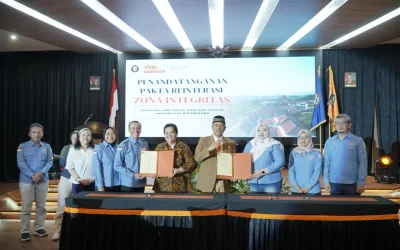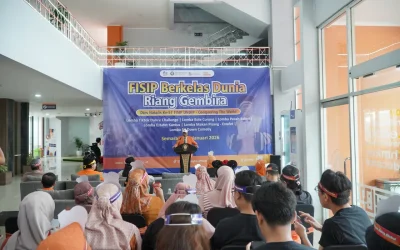FISIP UNDIP, Semarang (7/2) – The journal titled “Anti-Corruption Education Policy Outputs for Combatting Corruption in Indonesia: Applying the Theory of Planned Behaviour” focuses on evaluating the effectiveness of anti-corruption education policies in Indonesia in shaping students’ attitudes, norms, and behaviours. This study aims to address a research gap by assessing the outcomes of anti-corruption education policies using the Theory of Planned Behavior (TPB).
The introduction highlights the pervasive nature of corruption, often referred to as a “bureaucratic disease” that undermines good governance and social stability. The Indonesian government has implemented a “trisula” (trident) policy to combat corruption, which includes law enforcement, prevention, and education. The education component is particularly crucial as it aims to create a new generation of Indonesians free from corruption.
This study employs a quantitative approach and surveys 125 public administration students from Universitas Brawijaya and Universitas Diponegoro. The TPB model is used to analyze the data, which includes variables such as perceived behavioural control (PBC), attitudes, subjective norms (SN), and intentions. The results show that PBC significantly influences students’ anti-corruption behaviour, while attitudes do not. Additionally, SN positively affects anti-corruption intentions, and PBC significantly influences intentions. These findings indicate that anti-corruption education policies have a good level of effectiveness in achieving their goals.
The study also discusses the broader context of corruption in Indonesia, noting that corruption is a significant problem in educational institutions. The authors emphasize the importance of anti-corruption education in building self-awareness and integrity among students. They argue that educational institutions play a vital role in shaping political awareness and promoting positive political values. The study concludes by recommending the socialization of anti-corruption values to the public, the implementation of ideological education, and the enforcement of anti-corruption laws to enhance the success of corruption prevention and eradication policies.
Source: Lituhayu, D., Rahman, A. Z., Muluk, M. R. K., & Huda, M. N. (2023). Anti-Corruption Education Policy Outputs for Combatting Corruption in Indonesia: Applying the Theory of Planned Behaviour. Journal of Contemporary Governance and Public Policy, 4(2), 195-214.
Author Information:
Mohammad Nurul Huda, S.AP., MPA, is one of the lecturers in the Public Administration Department. Before teaching at Universitas Diponegoro, he completed his Bachelor’s degree (S1) at Universitas Brawijaya and then pursued his Master’s degree (S2) at Universitas Gadjah Mada. Currently, he teaches in the Undergraduate Program of Public Administration at the Faculty of Social and Political Sciences, Universitas Diponegoro.
Translator:
Nur Inayah





0 Comments